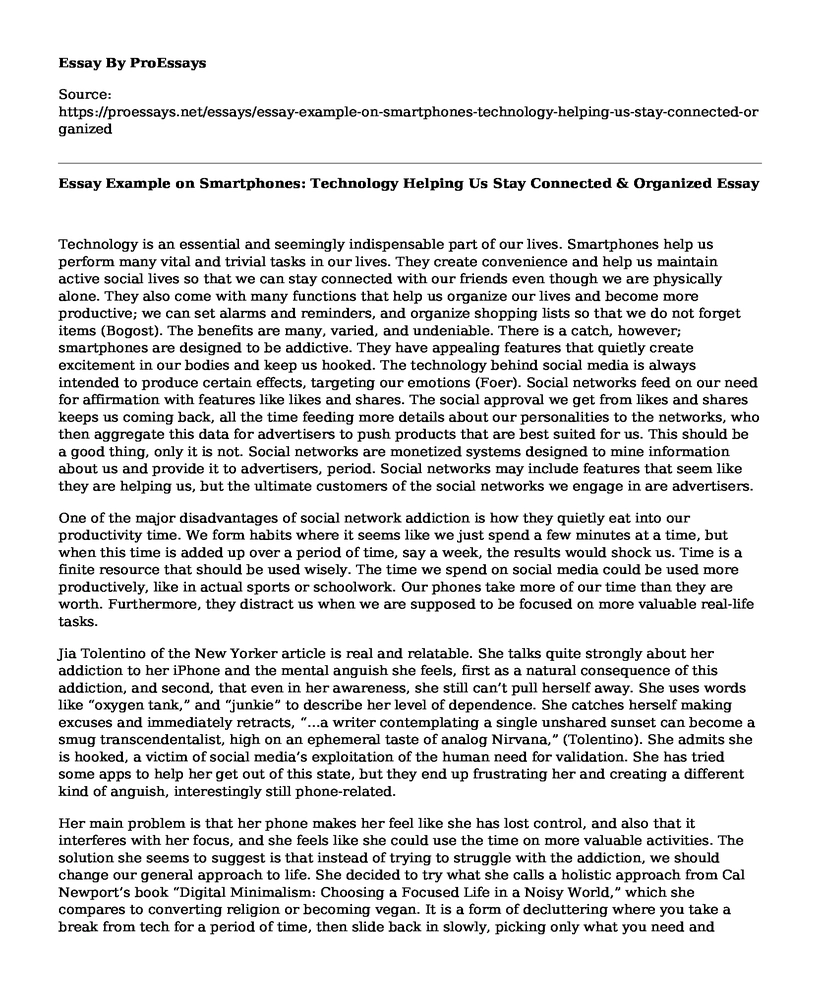Technology is an essential and seemingly indispensable part of our lives. Smartphones help us perform many vital and trivial tasks in our lives. They create convenience and help us maintain active social lives so that we can stay connected with our friends even though we are physically alone. They also come with many functions that help us organize our lives and become more productive; we can set alarms and reminders, and organize shopping lists so that we do not forget items (Bogost). The benefits are many, varied, and undeniable. There is a catch, however; smartphones are designed to be addictive. They have appealing features that quietly create excitement in our bodies and keep us hooked. The technology behind social media is always intended to produce certain effects, targeting our emotions (Foer). Social networks feed on our need for affirmation with features like likes and shares. The social approval we get from likes and shares keeps us coming back, all the time feeding more details about our personalities to the networks, who then aggregate this data for advertisers to push products that are best suited for us. This should be a good thing, only it is not. Social networks are monetized systems designed to mine information about us and provide it to advertisers, period. Social networks may include features that seem like they are helping us, but the ultimate customers of the social networks we engage in are advertisers.
One of the major disadvantages of social network addiction is how they quietly eat into our productivity time. We form habits where it seems like we just spend a few minutes at a time, but when this time is added up over a period of time, say a week, the results would shock us. Time is a finite resource that should be used wisely. The time we spend on social media could be used more productively, like in actual sports or schoolwork. Our phones take more of our time than they are worth. Furthermore, they distract us when we are supposed to be focused on more valuable real-life tasks.
Jia Tolentino of the New Yorker article is real and relatable. She talks quite strongly about her addiction to her iPhone and the mental anguish she feels, first as a natural consequence of this addiction, and second, that even in her awareness, she still can’t pull herself away. She uses words like “oxygen tank,” and “junkie” to describe her level of dependence. She catches herself making excuses and immediately retracts, “…a writer contemplating a single unshared sunset can become a smug transcendentalist, high on an ephemeral taste of analog Nirvana,” (Tolentino). She admits she is hooked, a victim of social media’s exploitation of the human need for validation. She has tried some apps to help her get out of this state, but they end up frustrating her and creating a different kind of anguish, interestingly still phone-related.
Her main problem is that her phone makes her feel like she has lost control, and also that it interferes with her focus, and she feels like she could use the time on more valuable activities. The solution she seems to suggest is that instead of trying to struggle with the addiction, we should change our general approach to life. She decided to try what she calls a holistic approach from Cal Newport’s book “Digital Minimalism: Choosing a Focused Life in a Noisy World,” which she compares to converting religion or becoming vegan. It is a form of decluttering where you take a break from tech for a period of time, then slide back in slowly, picking only what you need and cannot do without. She followed through with her experiment and, even though she didn’t feel a buzz of achievement, she did notice that her life had become more meaningful and that she was more self-aware in terms of her relationship with her phone. It stops taking over her time, and becomes more of a tool to use in her personal and professional life. She feels she has regained control of her life and can interact with her phone more meaningfully.
Conclusion
For my fellow students, my first question is, how long do you think you will live and what do you intend to do with the remaining time? My second question is, are the dreams you have for your life worth giving up for the thrill of your social media acceptance?
Works Cited
Foer, Jonathan. "Jonathan Safran Foer: Technology Is Diminishing Us". The Guardian, 2016, https://www.theguardian.com/books/2016/dec/03/jonathan-safran-foer-technology-diminishing-us.
Bogost, Ian. "I Tried To Limit My Screen Time". The Atlantic, 2016, https://www.theatlantic.com/technology/archive/2019/09/why-apple-screen-time-mostly-makes-things-worse/597397/.
Tolentino, Jia. "What It Takes To Put Your Phone Away". The New Yorker, 2019, https://www.newyorker.com/magazine/2019/04/29/what-it-takes-to-put-your-phone-away.
Cite this page
Essay Example on Smartphones: Technology Helping Us Stay Connected & Organized. (2023, Aug 12). Retrieved from https://proessays.net/essays/essay-example-on-smartphones-technology-helping-us-stay-connected-organized
If you are the original author of this essay and no longer wish to have it published on the ProEssays website, please click below to request its removal:
- Paper Example on Impact of Nanotechnology in Civil Engineering
- Solar Roof Tiles Essay
- Robots, Smart Materials, and their Future Impact on Humans Essay
- Getting Additional Lighting in the Neighborhood Paper Example
- Do Robots Deserve Legal Rights? A Study on Machines and Programs
- Enhancing Business Efficiency and Competitive Advantage - Free Report Sample
- Free Essay Example on Product Innovation: Re-Inventing the Life Cycle







